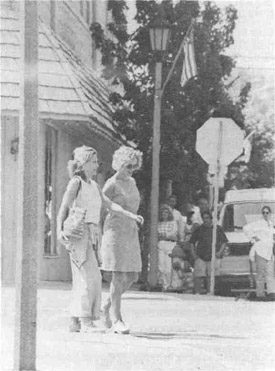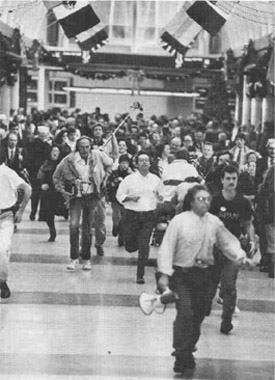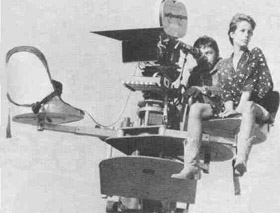|
LOCAL OFFICIALS PLAY A KEY ROLE IN
THE ILLINOIS FILM INDUSTRY
By LYNN MORFORD, Communications Manager, Dept. of Commerce & Community Affairs
Illinois may not be Hollywood, but the Illinois film
industry is strong and growing stronger. In recent
years, production levels in the state have topped $115
million, with nearly 23,000 jobs created.

Actresses Michelle Pfeiffer and Jessica Lange walk through a
scene prior to shooting in Rochelle.-Photo courtesy of Jeff
Robertson/Rochelle News-Leader
|
Local officials play a key role in "bringing in" a
film, according to Ron Ver Kuilen, Manager of the
Illinois Film Office at the Department of Commerce
and Community Affairs. The Illinois Film Office, with
the strong support of the Edgar administration, works
to attract feature film, television, and commercial production to Illinois. Ver Kuilen and his staff are generally the initial point of contact with filmmakers, but it
is the hospitality exhibited by local officials and their
desire to accommodate the special needs of the film
industry that generally seals the deal.
Typically, a production company calls the Illinois
Film Office, details the important locations that will
determine where they will shoot a film, and mails the
staff a copy of the screenplay. Ver Kuilen and his staff
read the script and review their extensive library of location shots to match them with the filmmaker's
needs. In some cases, Film Office staff will custom-shoot locations, sending the filmmaker four to five locations they feel will meet the needs.
If a filmmaker is intrigued, he or she flys in, and
the Film Office conducts guided tours of the locations.
After this "location scout," the filmmaker considers
the Illinois locations against those in other states or
nations, and chooses the location for filming.
As soon as possible, the Illinois Film Office or the
|
Since 1976 more than 700 feature films or TV
shows have been shot in Illinois and more than
$650 million has poured into the state's economy
directly from these projects.
The following are some films shot entirely or
in part in Illinois during the past 20 years:
Silverstreak
Looking for Mr. Goodbar
Somewhere in Time
The Blues Brothers
Ordinary People
Endless Love
Risky Business
16 Candles
Weird Science'
Ferris Bueller's Day Off
The Color of Money
The Untouchables
Adventures in Babysitting
Planes, Trains and Automobiles
When Harry Met Sally
Field of Dreams
Uncle Buck
Flatliners
Backdraft
A League of Their Own
The Babe
Wayne's World
Home Alone
Home Alone 2
Groundhog Day
Dennis the Menace
The Fugitive
Baby's Day Out
While You Were Sleeping
Richie Rich
Major League
|
November 1996 / Illinois Municipal Review / Page 25
film's location manager will discuss filming with the local officials from the community, including the mayor,
council members, the police and fire departments, and
parks and recreation officials. Requests and concerns
are discussed both informally and at council meetings.
The Film Office generally stays involved to ensure that
lines of communication are always open, and that
everyone's needs are met.
Mayor Bob Gingerich of Rochelle had nothing but
praise for his community's experience. The feature
film, "A Thousand Acres," based on the Pulitzer Prize-winning novel and starring Michelle Pfeiffer, Jessica
Lange and Jason Robards, recently completed shooting in Rochelle.
"The film company had been looking at locations
in Iowa, but really wanted a rural location as close to
Chicago as possible," Mayor Gingerich said. "Our economic development director had already told the
Illinois Film Office we were willing to host a film, and
when they came out, they liked what they saw.

Film crew prepares to shoot a scene of "Home Alone" at O'Hare
Airport.-Photo courtesy of IL Film Office
|
"Our people reacted well. The company held a
casting call for extras expecting about 500, and 3,000
people showed up to serve as extras and stand-ins. We
had quite a few spectators when they did visible filming on streets. It got kind of hectic and disrupted traffic, but everyone adjusted."
"There were so many benefits," continues the
Mayor. "Several local residents were extras. Many actors lived in the community - the director rented the
home of a family that was in the process of moving
and a local teacher wound up being a tutor for her seven-year-old son. It also was an economic boon to the
community. One of our auto dealers sold five cars, two
alike because one was wrecked as part of a scene and
they needed the twin for other shots. Two flower shops
receive regular orders for cast and crew birthdays and
centerpieces. The savings and loan went along with the
spirit and changed the name on its outside sign to fit
with the film. They even built a house. They were using a farmstead out of Rochelle and needed a house
across the road. They went in and built a house shell,
buying all the lumber here, planted new crops because
some scenes needed spring crops, put up a windmill
and drilled a well to water the sod around the house.
|
"We found it all a very positive experience. The
biggest inconvenience was to shut down traffic occasionally for filming on the street, but most everyone
found the film people were great to get along with. We
also had to free up space in a city parking lot for the
trailers and other equipment. You do have to be flexible because a change in weather can cause the shooting director to use a different scene.
"Another plus was that we were able to offer them
a big building that had been recently vacated by a business. They used it for set construction and indoor
shoots and used the offices for the production company and location people.
"If your community is chosen for a film, I don't
think you're going to have any regrets. It's good for the
community both financially and publicity-wise. The
Page 26 / Illinois Municipal Review / November 1996

Actress Jamie Lee Curtis watches a scene from "Grandview
U.S.A." filmed in Pontiac.-Photo courtesy of IL Film Office
|
film people ate in our restaurants and shopped in our
stores, particularly the grocery stores (even the extras
eat really well.) We're willing to do it again."
Ver Kuilen says Mayor Gingerich's observations
are consistent with those of other communities. He reminds local officials that, when a film crew comes to
town, it is somewhat like a small, friendly invasion. But
fortunately, the benefits far outweigh the inconveniences. Not only does the community learn from and
participate in the filming experience, but nearly every
business, from the restaurant to the dry cleaner, is impacted. Most people, in fact, are proud when their
town is chosen to "star" in a film.
|
Chicago often is chosen as a location site for obvious reasons: easy accessibility to crews, housing and
equipment. But the Illinois Film Office works diligently to showcase the rest of Illinois to the film industry,
as well. Woodstock and Crystal Lake, for example,
doubled as Punxsatawny, Pennsylvania in the hit film,
"Groundhog Day." The Champaign-Urbana campus of
the University of Illinois served as Harvard University
in the film, "With Honors." This summer, in addition
to the filming in Rochelle, West Chicago and
Westmont hosted the new John Hughes film, "Reach
the Rock." The new television series, "Early Edition,"
is filming in both Oak Park and Chicago. And the independent film, "35 Miles from Normal," has been
filming in Pontiac, the home town of its director, who
was inspired to seek a career in the film industry after
observing filming on the movie, "Grandview U.S.A.,"
which was filmed in Pontiac in the mid-1980s.
Ver Kuilen says the Illinois Film Office is dedicated to the principle of economic development through
film, television, commercial and video work. Its staff
are called upon daily to cut red tape, dispense production information, and answer public inquiries, as
well as to provide assistance with location scouting,
crewing, hotel accommodations and community liaison services.
"So if Hollywood comes knocking at your community's door, by all means let them in," Ver Kuilen
says. "And call the Illinois Film Office for assistance to
help ensure that the filmmaking process is a fun and
profitable experience for all." •
|
POINTS TO REMEMBER WHEN
WORKING WITH FILMMAKERS
1. Ask how many days and what hours the company will be in your town.
2. Find out what is being filmed. Have them
describe the scenes completely.
3. Will there be an advance group coming in to
prepare the site for the film crew?
4. How many people can you expect to be
involved with the production?
5. Is an assembly or staging area required for
equipment or personnel?
6. Where will the production vehicles park?
7. Will an external power source be used for
lighting, or will access be required to an
internal source?
8. How much additional security, police or
other personnel will be required?
9. Will there be alterations to property?
10. Will any areas be closed off to the public?
11. Where will the cast and crew be fed their
meals?
12. What is the best point of access for the filmmakers and their equipment.
13. It is always easier if there is only one contact
person at the location and with the company.
14. How soon will things be restored if need be?
15. Make sure they return the property to its
original condition.
16. Regarding insurance . .. Ask to see proof of:
Third party property damage
Personal injury/liability
Hold harmless agreement (will insure
against any and all liability claims)
Comprehensive general liability.
17. Location Agreement
You can put riders on the contract. Be prepared that it may take additional approval
time.
The agreement allows for a company to
come back if necessary at a mutually agreeable time.
Feel free to take photos of the area to be
used for filming before the company comes
to use as a reference later if needed.
18. Let the company know of any restrictions at
the initial meeting.
19. Try to be flexible with the production companies and realize that schedule changes are
not uncommon.
|
November 1996 / Illinois Municipal Review / Page 27
|